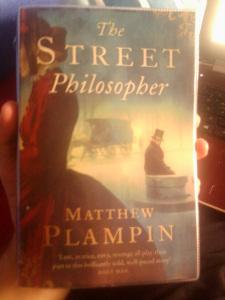
Thomas Kitson, a one-time art critic, was recruited by the London Courier to be a war correspondent. While there, he witnessed the brutality and horrors of war, but also an act of treason, the consequences of which have now turned up in the streets of Manchester where he is now working as a street philosopher.
I’d never heard the term street philosopher before. It’s a derogatory term for those people who hunt the streets for snippets of gossips then put them into newspapers. I studied Philosophy, and it’s what first attracted me to The Street Philosopher, and I found it to be quite a humorous term that shows how little regard people have for philosophers. The book does not focus on that though, the focus is on the Crimean War and the crimes that were committed. While Kitson is the focus of the blurb it’s an ensemble cast rounded out with people like Richard Cracknell – Kitson’s superior who has a disdain for the way the military is run, Styles – an illustrator who is continually goaded by Cracknell and seeks to prove that he’s not a coward, Boyce – a military leader with a black soul, and others. Each character is given a great deal of depth and motivation, and as such they leap off the page and feel like vibrant beings, each of them have their flaws and sympathies and it captivating in their own right. Plampin jumps through each character to show their own perspectives and this is done smoothly, either at the beginning of new chapters or with a break in sections within chapters.
The narrative is split between two timeframes. There are the events that happen in the war and then the events that happen in Manchester. The book jumps between them, devoting sections to each period and clearly marking which moment in time is being focused on. I liked is as mysteries were revealed, and new truths emerged at just the right moments to tease intrigue. I liked both periods equally, and it was exciting to see what happened in the war to make Kitson et al end up like he did.
Plampin has a real talent for description and this came through with the characters, the grittiness on the battlefield and the emotions that people were feeling. Sometimes though, his greatest strength is also his greatest weakness as I felt some things were explained too much, and more impact could have been had with a more varied approach by included some bluntness.
I found the revelations fitting and none seemed anti-climactic, although the novel retained a consistent pace and didn’t build to a grand climax. I felt it dragged at certains points, and I can imagine some people will find it difficult to get through certain portions. Certainly, if you are not interested in war at all then this may be one to avoid since a fair portion does follow action on the battlefield. I’m not too familiar with the Crimean War so I liked the focus on this period, and felt that the crusty, stiff upper-lip attitude of the British military was captured perfectly.
The Street Philosopher is a book that I picked up from the library on a whim, based mostly in the title. I found it to be an engrossing read with well-developed characters and a plot that threaded through many different lives and timelines. I enjoyed it quite a bit and although I found that it dragged at certain points I was never in danger of abandoning the book. It’s a good story with some intrigue, battlefield action and human folly.
